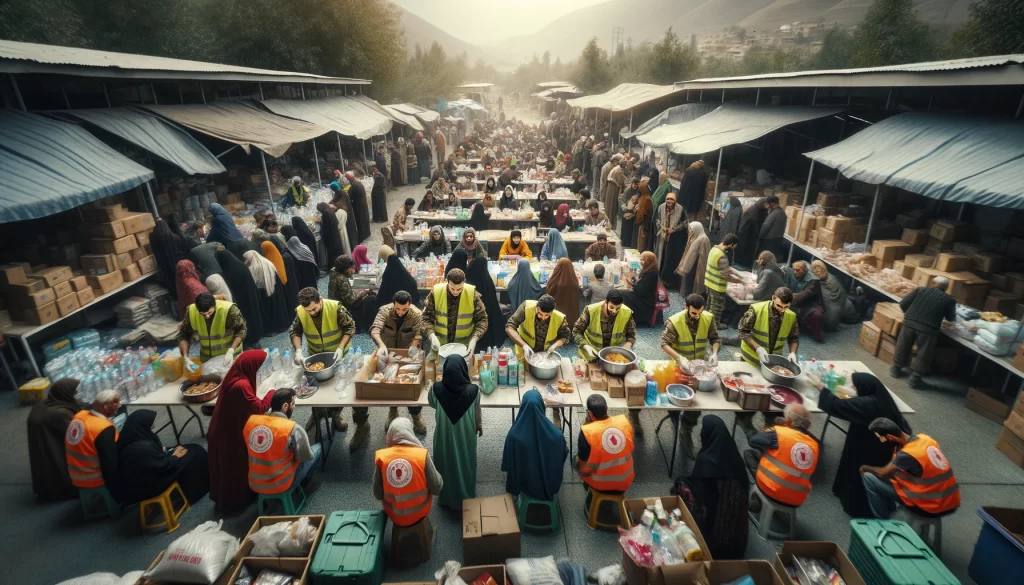On Thursday, President Joe Biden held a pivotal conversation with Israeli Prime Minister Benjamin Netanyahu. This exchange came in the wake of a tragic event where seven aid workers, affiliated with the José Andrés-founded World Central Kitchen, were killed by an Israeli strike. This incident not only sparked global outrage but also prompted a reevaluation of U.S. policy towards the ongoing war in Gaza.
President Biden, “shaken” by the loss of life, emphasized the necessity for Israel to take immediate and discernible steps to mitigate civilian suffering and ensure the safety of aid workers. The call between the leaders marked a significant moment, signaling for the first time Biden’s readiness to reconsider the steadfast U.S. support for Israel’s military actions in Gaza. This shift comes amid increasing calls from key Democrats to condition future weapon sales to Israel on the basis of its actions in the conflict, especially given the alarming rise in civilian casualties in Gaza, with the death toll surpassing 33,000 according to reports from the Gaza Health Ministry.
The urgency of the situation is further highlighted by Secretary of State Antony Blinken and Senator Chris Coons, a notable ally of Biden and a staunch supporter of Israel. Both have echoed the president’s sentiments, stressing the need for conditional military aid and immediate action to address the humanitarian crisis.

The humanitarian crisis in Gaza has reached a critical point, with the southern city of Rafah, now home to up to 1.5 million displaced Palestinians, bracing for a potential large-scale invasion by Israeli forces. The U.S. has explicitly warned against actions that would further endanger civilian lives in this already dire situation. In response to these concerns, Israel has announced measures to facilitate the delivery of humanitarian aid, including opening the Ashdod port and the Erez crossing, and increasing aid shipments from Jordan. These steps, while initial, are seen as essential towards addressing the urgent needs of the people in Gaza and are expected to be rapidly implemented.
In his conversation with Netanyahu, Biden stressed the unacceptable nature of the current humanitarian situation in Gaza, calling for an immediate ceasefire and urging the Israeli Prime Minister to take decisive actions to bring the hostages home.
The unfolding events in Gaza, marked by a humanitarian catastrophe, the displacement of over 80 percent of the population, and acute food insecurity, underscore the critical need for concerted efforts to address the crisis. The death of humanitarian aid workers, including those from World Central Kitchen, has brought a renewed focus on the importance of protecting civilians and aid personnel in conflict zones.
This article is based on the following article:

Background Information
With this background, readers can better appreciate the complexity of the Israeli-Palestinian conflict, understand the critical role of humanitarian aid, and recognize the significance of diplomatic efforts in seeking resolutions to such enduring conflicts.
The Israeli-Palestinian Conflict
- Historical Background: The Israeli-Palestinian conflict has deep historical roots, tracing back to the early 20th century, primarily over territorial disputes in the Middle East. After the Holocaust in World War II, the international community (through the United Nations) proposed partitioning the land, then known as Palestine, into a Jewish and an Arab state. This proposal led to the establishment of Israel in 1948 but was met with resistance from Arab states and the Palestinian Arab population.
- Key Issues: The conflict is centered around several key issues, including borders, the status of Jerusalem, security concerns, and the right of return for Palestinian refugees. Over the decades, various efforts to negotiate peace have been made, but lasting solutions have remained elusive.
Humanitarian Aid in Conflict Zones
- Importance: In areas affected by conflict, such as Gaza, humanitarian aid is crucial for providing basic needs like food, water, shelter, and medical care to displaced and vulnerable populations.
- Challenges: Delivering aid in these regions can be highly challenging due to security risks, damaged infrastructure, and sometimes restrictions imposed by the parties in conflict. The safety of aid workers is a significant concern, as they can become targets, intentionally or unintentionally, during military operations.
International Diplomacy
- Role of the United States: The U.S. has historically been a key player in Middle East politics and has often served as a mediator in Israeli-Palestinian peace efforts. Its support for Israel is a significant aspect of its foreign policy in the region.
- Changing Dynamics: The stance of the U.S. and other countries on the Israeli-Palestinian conflict can influence international efforts toward peace and humanitarian relief. Diplomatic relations and aid policies can change based on the actions of the parties involved in the conflict, global political pressures, and shifts in public opinion.
Understanding the Current Situation
- Gaza: A small, densely populated territory on the eastern coast of the Mediterranean Sea, bordered by Israel and Egypt. Gaza has been under a blockade imposed by Israel and Egypt since 2007, significantly restricting the movement of people and goods in and out of the territory.
- Hamas: A Palestinian Islamic organization, with a military and a political division, that controls Gaza. It is considered a terrorist organization by Israel, the United States, and the European Union, among others. Hamas and Israel have engaged in several conflicts since Hamas took control of Gaza.
- Humanitarian Crisis: The blockade and recurring conflicts have led to a severe humanitarian crisis in Gaza, with widespread poverty, unemployment, and limited access to essential services like healthcare and clean water.

Debate/Essay Questions
- Is it justifiable for a country to prioritize its national security concerns over international humanitarian laws during conflicts?
- Should humanitarian organizations operate in conflict zones if their safety cannot be guaranteed?
- What responsibilities do conflict-involved states have to protect humanitarian aid workers, and how should the international community respond when these protections fail?
Please subscribe to Insight Fortnight, our biweekly newsletter!
